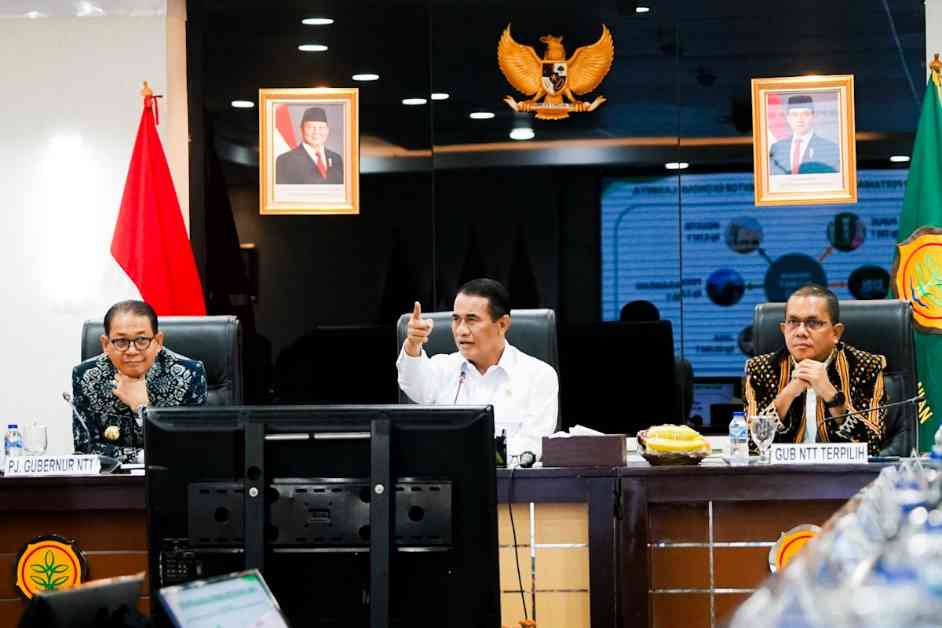In a recent meeting in Jakarta, Agriculture Minister Andi Amran Sulaiman emphasized the importance of cultivating paddy on 188 thousand hectares of land in East Nusa Tenggara (NTT) province to enhance food security and achieve self-sufficiency. This ambitious goal, he explained, would require significant improvements in irrigation, pumping, and the provision of production infrastructure and facilities.
Minister Sulaiman highlighted the vast potential of NTT in the agricultural sector, noting that accelerating rice production in the region could not only meet local demand but also contribute to the national production target. To ensure the success of this agricultural development program, he called for strong synergy between the central government, regional authorities, the Indonesian Military (TNI), the National Police (Polri), and other stakeholders.
During the meeting, Sulaiman engaged with the acting governor of NTT, Andriko Noto Susanto, and other regional leaders to formulate concrete steps for advancing the agricultural sector in the province. He underscored the transformative impact that agricultural development could have on poverty alleviation in NTT, where approximately 20 percent of the population currently lives below the poverty line.
“We know that NTT is an agrarian region, with agriculture, livestock, and fishery sectors dominating 85 percent of the economy. By focusing on these sectors, we have the opportunity to address poverty effectively,” Minister Sulaiman stated passionately. Looking ahead, he revealed the government’s ambitious target of reducing the poverty rate in NTT to below 10 percent, or even 5 percent, within the next five years.
In response, Governor Susanto reaffirmed the provincial government’s commitment to pursuing the cultivation of 188 thousand hectares of paddy fields by 2025. While acknowledging the potential for creating new paddy fields in the future, he emphasized the importance of prioritizing this target to ensure sustainable agricultural growth in the region.
Challenges and Opportunities in NTT Agriculture
NTT’s agricultural sector faces a unique set of challenges and opportunities as it strives to expand paddy cultivation on a massive scale. The province’s rugged terrain, limited access to modern farming technologies, and vulnerability to climate change all present significant obstacles to increasing agricultural productivity. However, with the right investments in infrastructure, irrigation systems, and training programs, NTT has the potential to become a key player in Indonesia’s rice production.
Expert insights suggest that by leveraging innovative farming techniques, such as precision agriculture and organic farming practices, NTT can not only boost its crop yields but also enhance the quality and sustainability of its agricultural output. Collaborative efforts between government agencies, private sector partners, and local communities will be crucial in driving this transformation and ensuring the long-term success of the agricultural sector in the province.
Empowering Communities for Sustainable Growth
As NTT embarks on this ambitious journey towards agricultural self-sufficiency, it is essential to prioritize community empowerment and capacity-building initiatives. By providing farmers with access to training, resources, and market linkages, the government can help rural communities thrive and contribute meaningfully to the province’s agricultural development.
Local leaders and stakeholders must work hand in hand to create an enabling environment for smallholder farmers, encouraging innovation, entrepreneurship, and sustainable farming practices. Through targeted investments in rural infrastructure, education, and healthcare, NTT can unlock the full potential of its agricultural sector and pave the way for inclusive growth and prosperity across the province.
In conclusion, the path to achieving food security and poverty alleviation in NTT is challenging but full of promise. By investing in sustainable agriculture, fostering collaboration among stakeholders, and empowering local communities, the province can chart a course towards a more resilient and prosperous future for all its residents. Let’s work together to cultivate a brighter tomorrow, one paddy field at a time.






















